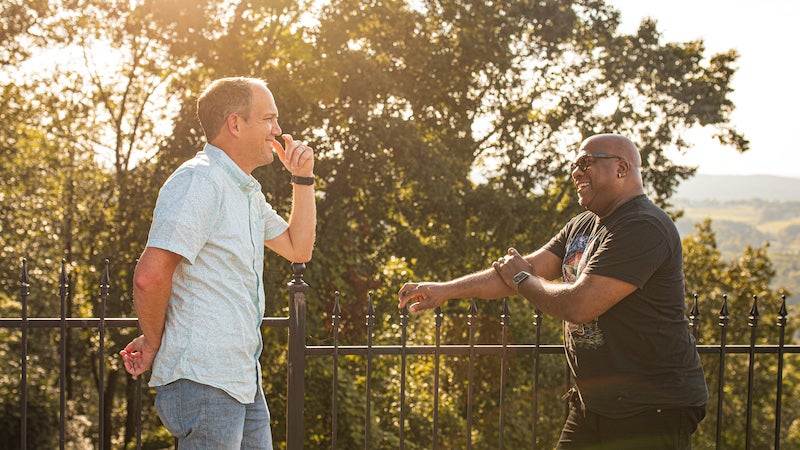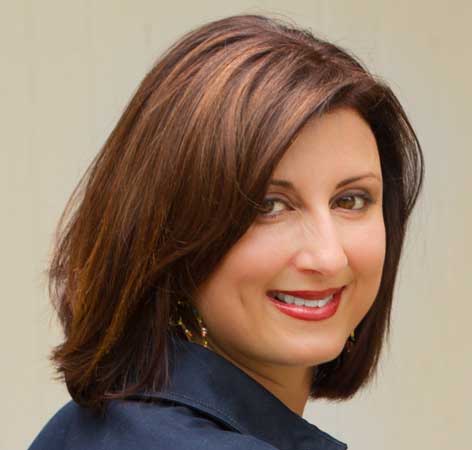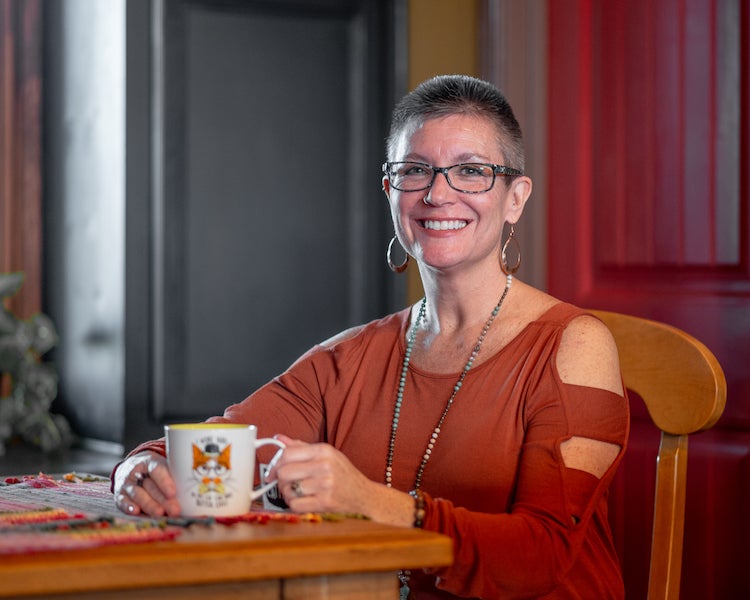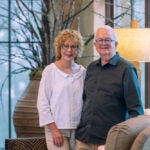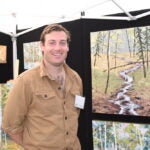“A black guy and a white guy walk into a bar. They play some music. They talk about race. They made a podcast. It’s no joke. But it is often funny.”
So reads the tag line of a 2 Americas, a podcast that came to life in Bluff Park a couple of months after COVID-19 settled in this year. The banter between its hosts Jesse Suttle (the black guy) and Corey Nolen (the white guy) first started when they began playing music together about five years ago, sometimes up at Moonlight on the Mountain, a listening room that operated in Bluff Park until recently. From there grew a friendship where conversations about race would come up.
“We were seeing things in similar ways but from different perspectives, and that added fuel to the conversation,” Corey recalls. “The way Jesse approaches people makes them feel comfortable. My heart and mind were changing in those years to be more activist-like, and a lot of the things I was saying were resonating with him.”
And from those conversations the podcast was birthed with the first episode going live in early June. By summer’s end eight were available for listening, covering current events, history, culture, religion and family stories, all book ended with banter that’s sure to make you laugh, and a new set of shorter episodes with the same basic formula was in the works. In all of it, Corey and Jesse will tell you they want to bring people from different cultures together to find answers to the difference between the white American experience and the black American experience.
To learn more about it all, we sat down with the duo at Wild Roast coffee shop—fittingly the same space where they first played music back when it was Moonlight on the Mountain—to chat about their on-air conversations.
Where did the idea for the podcast come from?
Corey: (Jesse and I) went to Mr. P’s for lunch a little over a year ago. I remember thinking this (issue) is still very present and the conversation is needed. I felt like I had a responsibility to use whatever platform I have to have a conversation with the person I knew who could say it in ways that were easy for me to hear. The best thing we could do was not get into a heated debate. I would think about it every week or two for that year. Both of our lives were much busier, and then when the pandemic hit, it was time. I had also started freelancing for I Heart, and I had all the tricks (for podcasting).
Producing a podcast requires a lot of time. What makes it worth it for you?
Jesse: We are doing this for us and needed to get it out of our collective consciousness. If people dig it, that’s great, and if not, we haven’t lost anything… I am not going to go out and do protests and marches. For me this is me being an activist in a way that I can do it safely. I want people learn to communicate and see people as people no matter who they are or where they are from.
Corey: If five people say this is worth it and it’s made a difference, that might be worth it, and hundreds and thousands have listened at this point.
Where did the music at the start of each episode come from?
Jesse: The intro music is a band I was in with guy named Shariff Simmons, an actor, poet and musician from New York. I did a record with him about 10 years ago called Modern Democracy, and a lot of these same topics (that are on the podcast) were coming up between he and I. A lot of the lyrics of that album lend themselves to these same conversations. That song is called “Testify.” It’s about how from an African American perspective the America we live in and the America that is touted as being the America for everyone (aren’t the same)—it’s what the podcast is about.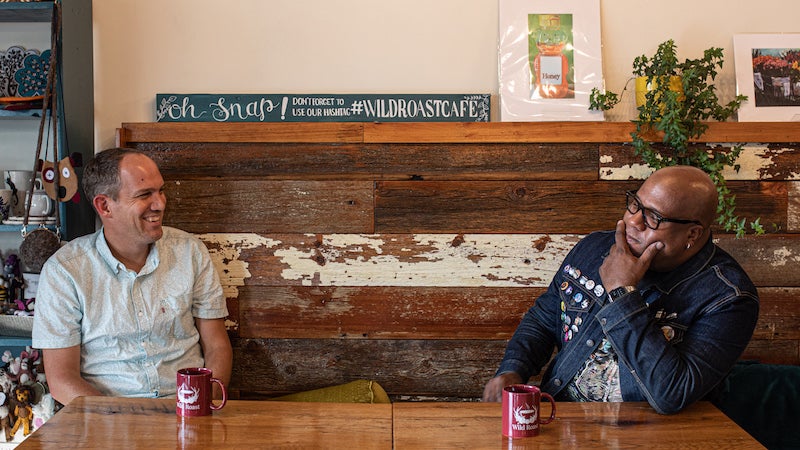
What roles do each of you play in the podcast?
Corey: My role is to get a sense of where the community is and what it’s saying and making assumptions about. Then Jesse brings the backbone and meat and historical and experiential perspective; that’s where the richness of this would come from. My bringing up these topics makes it inviting (for our listeners).
Jesse: It gave me an opportunity to express my ideas in a format that wasn’t so confrontational.
There’s a lot of humor in the podcasts too. Was that intentional?
Jesse: (These topics are) so heavy, and we don’t want people saying they can’t take it anymore. Having bits of levity give you a breather.
Corey: It’s like a Cohen Brothers approach. If you just walk in this room and start talking about (hard things), people can check out. If I wanted to build a bridge with someone I didn’t know, I wouldn’t start talking with politics. It’s the same idea for this. We like to have fun and laugh and talk about music too.
Jesse: There are moments of laughter and humor but also moments of pain.
What kind of feedback have you gotten on the podcast?
Jesse: I have gotten nothing but positive feedback. People in the neighborhood will stop me walking the dog and say, “I listened to the podcast. Keep doing them.” People have been real supportive. I had a guy on Park Avenue say, “Man, I wanted to tell you that podcast has helped me and helped me see blind spots I didn’t know I had.” That’s encouraging that people can be introspective from something we have put out in the world. It helps me work on stuff too talking about it because I still have blind spots too.
Corey: People who might not have the same access to a relationship like (mine with Jesse) are very open to this.
Where did the name 2 Americas come from and how would you define it?
Corey: Martin Luther King Jr. had a speech about 2 Americas, and Obama made a speech about it in a hopeful way. The idea was already there, and it seemed to apply. It needed to be thought-provoking and make a statement that things are divided. I have learned if you are black you have to learn two systems; I didn’t realize that until we started doing this podcast. Black people have to learn two Americas, and white people generally only have to learn one America.
Jesse: For me America is essentially two countries. It has been racially divided from the inception. White America is the America that’s held up to the world. That’s not the America black people have lived in. Even though I live in this neighborhood, I still go back to the other America once a week. Here yards are all kept and the streets are repaved, but most of the roads on the other side are not and houses are dilapidated. That’s part of why I am drawn to sci fi and Star Trek; they have figured out a way where everyone can live the same life. We all want share in the reward of society, and in America that has not become true yet.

